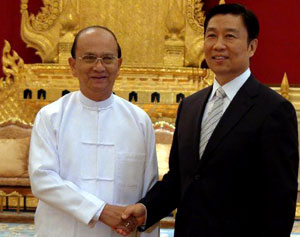The visits to Burma by Chinese and U.S. officials this week will not change the central government’s nearly five-decade-long policies of Burman nationalism and the imposition of Buddhism on minorities, ethnic politicians said.
This policy was adopted by Burman general, Ne Win, in 1962 and it has been more and more practiced by Burman military leaders, the successors of Ne Win.
 A senior officer of the Kachin Independence Organization (KIO) said, on condition of anonymity, successive Burman military leaders from Ne Win’s era to date, keep the ideology that peace can be restored in the country only after all the different ethnic identities are dissolved into one Burman identity.
A senior officer of the Kachin Independence Organization (KIO) said, on condition of anonymity, successive Burman military leaders from Ne Win’s era to date, keep the ideology that peace can be restored in the country only after all the different ethnic identities are dissolved into one Burman identity.
A KIO officer said the cunning Burmese politicians are now playing political games with the U.S. and China when they met with U.S. Sen. John McCain and Chinese official, Le Yuanchao, this week, which is also a trick or technique for implementing part of Ne Win’s nationalism policy.
Sen. McCain met Burmese Vice-president U Tin Aung Myint Oo and U Shwe Mann, Speaker of Myanmar's Parliamentary House of Representatives and Vice Chairman of the Union Solidarity and Development Party (USDP) on Wednesday, June 1.
He also met pro-democracy leader Daw Aung San Suu Kyi in her house in Rangoon the next day.
At the same time, Mr. Li Yuanchao, head of the Organization Department of the Communist Party of China’s Central Committee, met Burmese President, Thein Sein, in Naypyidaw, on Thursday, June 2. Li also met U Tin Aung Myint Oo and U Shwe Mann.
Duwa Maran Zau Awng, a former representative of the National League for Democracy (NLD) party of Waingmaw Township, in Kachin State, who currently lives in Florida, U.S.A., said, “Sen. McCain’s trip is important for the development of democracy in Burma. I think the Chinese official’s visit to Burma aims to erase McCain’s promise about ending military control in Burma.”
China is now constructing military posts on the Burma border for monitoring political instability and the development of ties between the Burmese government and the U.S.
Bum Htoi, a former officer of the Communist Party of Burma (CPB) said Burmese politicians and military leaders are cunning and they are shouldn’t be trusted to be honest. They are capable of playing the two super powers against each other to achieve their own advantage.
Senior Kachin politician, Duwa Zau Awng, said both the Chinese communist government and the military-backed Burmese government have the same record of violating human rights, especially minority rights and oppressing political opposition groups.
The multi-ethnic union of Burma was formed by Burman, Kachin, Shan and Chin leaders in accordance with the 1947 Panglong Agreement. The historic treaty brought about Burma’s independence from British rule in 1948.
By using country’s power and military, Burmanization and Buddhism have been foisted on the non-Burman communities with different techniques, including divide and rule policies and creating inter and intra ethnic conflicts.



